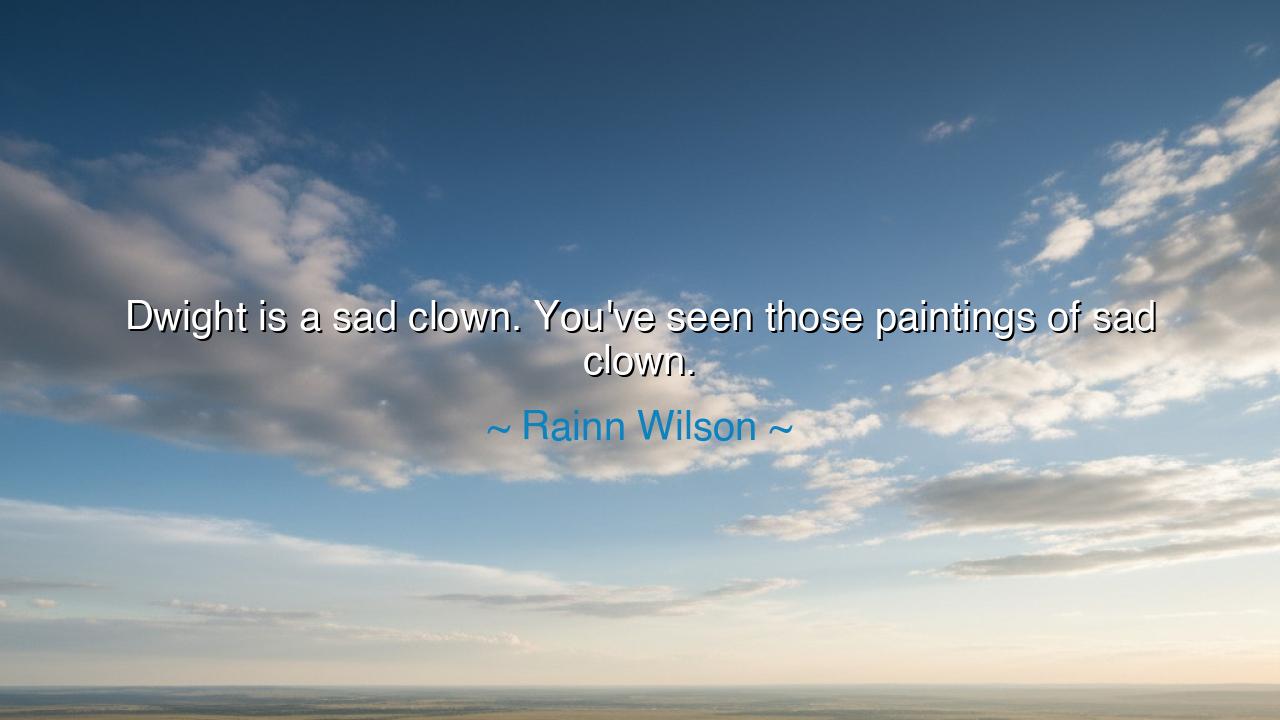
Dwight is a sad clown. You've seen those paintings of sad clown.






When Rainn Wilson said, “Dwight is a sad clown. You’ve seen those paintings of sad clown,” he was not merely describing a fictional character—he was touching upon one of the oldest truths about the human condition: that beneath the mask of laughter often lies a heart burdened by loneliness. In his portrayal of Dwight Schrute, Wilson saw not just comedy, but tragedy wrapped in absurdity. The “sad clown” is a timeless symbol, known across ages and cultures, representing those who bring joy to others while quietly carrying their own sorrows. It is the paradox of the performer, and, indeed, of life itself—that joy and pain, humor and heartbreak, often dwell side by side within the same soul.
To call Dwight a “sad clown” is to reveal that his eccentricities—his rigid loyalty, his social awkwardness, his relentless pursuit of recognition—mask a deeper yearning for connection. The laughter he provokes is the laughter of recognition; in his exaggerated behavior, we see our own struggles for love and belonging reflected back at us. The “paintings of sad clowns” that Wilson references, those haunting portraits with painted smiles and tearful eyes, have long embodied this duality. They remind us that the act of making others laugh can sometimes be a way of hiding one’s own ache. The clown’s painted smile becomes both shield and confession, an image of strength and fragility intertwined.
The origin of the sad clown archetype stretches deep into history. In ancient Rome, the comic actor or mimus often mocked the powerful, yet beneath the satire lay a commentary on the pain of the common man. In the Italian commedia dell’arte, the character Pagliaccio (from whom we get “the clown”) was a tragic fool—a man whose love was unreturned, whose laughter concealed heartbreak. Later, in opera and art, this figure evolved into Pierrot, the white-faced dreamer whose tenderness was always met with cruelty. These figures, like Dwight, remind us that those who seem foolish or strange often bear the most tender hearts. The sad clown is the mirror of humanity itself: ridiculous, vulnerable, and deeply yearning for love.
Rainn Wilson, an actor of great spiritual depth, understood that to play such a character is not to mock him but to reveal his humanity. Dwight Schrute is funny because he is painfully real. His devotion to his work, his longing for approval, his confusion in matters of love—all of it arises from a heart that feels too much and understands too little. He wears his eccentricity like makeup; it both defines him and hides him. In that sense, Dwight is not unlike the ancient fool of the king’s court, who spoke truth in jest and wept behind the curtain. Through laughter, we are invited to see ourselves more clearly—and to forgive what is awkward, flawed, and yearning within us.
There is a profound sadness in the image of the clown because it reflects the human condition itself. Every person, at some point, must wear a mask—smiling while grieving, performing strength while feeling weak. We live in a world that rewards the cheerful and hides from the sorrowful, and so we learn to disguise our pain beneath humor or busyness. Yet, as Wilson reminds us through his insight into Dwight, those who can laugh while carrying their sorrow are not hypocrites—they are healers. They teach us that life’s pain need not destroy the capacity for joy, and that even wounded souls can still bring light to others.
Consider the great Charlie Chaplin, whose “Little Tramp” character danced and stumbled through life’s indignities with a rose in his hand. Chaplin made the world laugh, but his genius was born from hardship, poverty, and loss. He once said, “To truly laugh, you must be able to take your pain and play with it.” That is the essence of the sad clown, and of Dwight as Rainn Wilson saw him. The humor is not empty—it is the alchemy of suffering transformed into compassion. The clown’s tears become the world’s laughter, and in that exchange, both find healing.
The lesson of Rainn Wilson’s words is both tender and profound: do not dismiss the fool, the eccentric, or the clown. Behind every exaggerated gesture and awkward smile may lie a soul that feels more deeply than others dare to. And within yourself, honor the parts that ache even as you laugh. Life will ask you to wear masks—of confidence, of joy, of strength—but remember that even behind the paint, your tears have value.
So let us learn from the sad clown: to laugh not in denial of pain, but in defiance of it. Let us find beauty in imperfection, and humanity in humor. For those who, like Dwight, stumble and strive and make us smile, are the quiet saints of the world—the ones who remind us that laughter and sorrow are not opposites, but two notes of the same song, played by the eternal heart of man.






AAdministratorAdministrator
Welcome, honored guests. Please leave a comment, we will respond soon